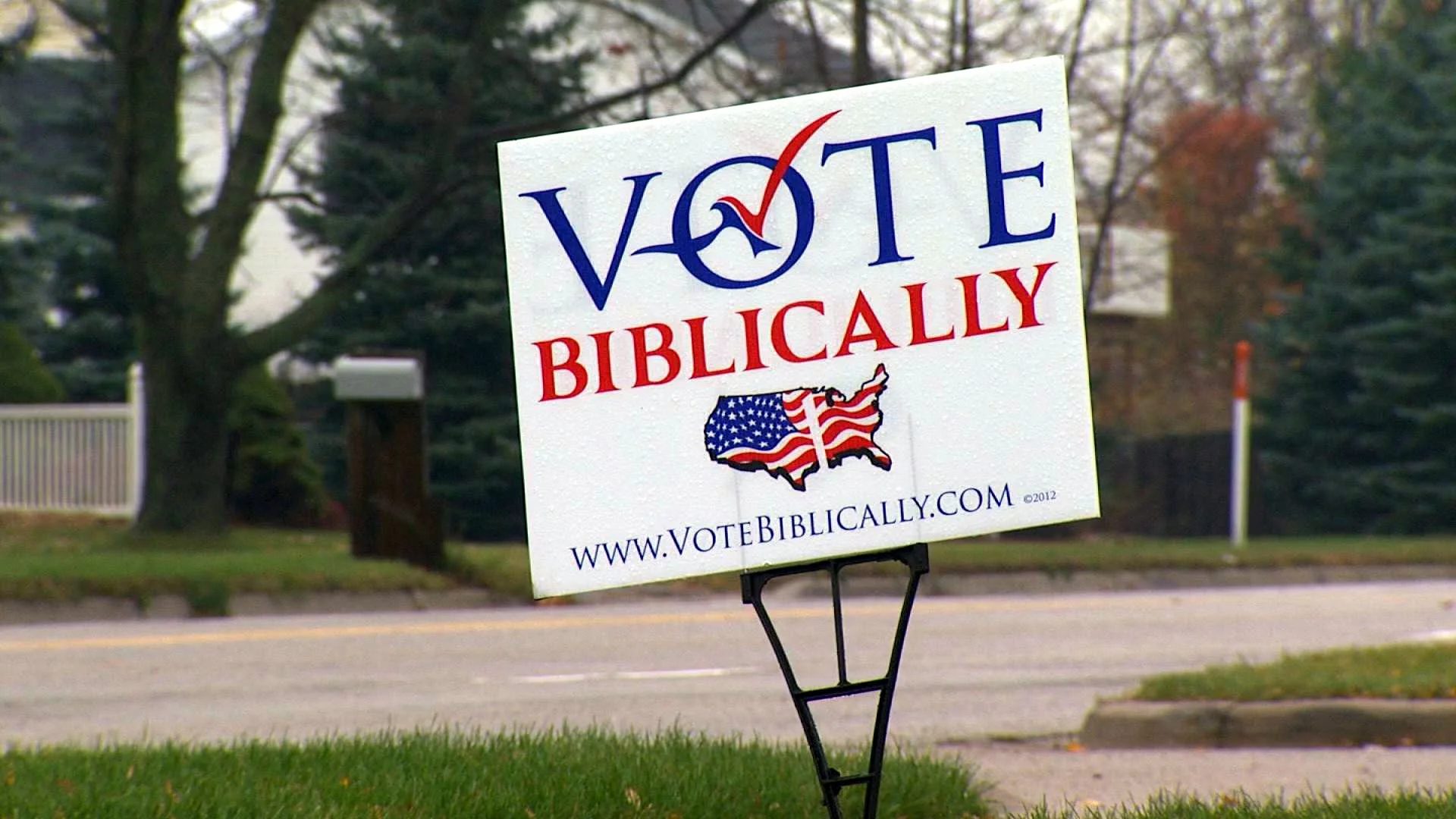Call to Action
To give the bottom line up front, as one of the elders at Harvest Bible Chapel Pittsburgh North, let me encourage you to take on two immediate (and bare minimum) responsibilities that we have as it relates to participation in government as citizens of this country.
1. Pray. We must pray for God to raise up godly leaders, to equip any leaders (godly or otherwise) to use their delegated authority for God’s purposes. Prayer isn’t the last thing we should do, it is paramount to living the life that God has called us to.
First of all, then, I urge that supplications, prayers, intercessions, and thanksgivings be made for all people, for kings and all who are in high positions, that we may lead a peaceful and quiet life, godly and dignified in every way.
- 1 Timothy 2:1-3
2. Vote. This is maybe the harder sell, because there isn’t a clear Bible verse that commands us to vote. Frankly, that’s because American-style self-government is rare and exceptional; with our sinful bent, humans naturally tend towards totalitarianism, where only the few rule. However, there are principles that would demand that we best leverage whatever is given to us for maximum kingdom benefit:
Choose for your tribes wise, understanding, and experienced men, and I will appoint them as your heads.
- Deuteronomy 1:13
“You are the salt of the earth, but if salt has lost its taste, how shall its saltiness be restored? It is no longer good for anything except to be thrown out and trampled under people’s feet. “You are the light of the world. A city set on a hill cannot be hidden. Nor do people light a lamp and put it under a basket, but on a stand, and it gives light to all in the house. In the same way, let your light shine before others, so that they may see your good works and give glory to your Father who is in heaven.
- Matthew 5:13-16
Then Mordecai told them to reply to Esther, “Do not think to yourself that in the king's palace you will escape any more than all the other Jews. For if you keep silent at this time, relief and deliverance will rise for the Jews from another place, but you and your father's house will perish. And who knows whether you have not come to the kingdom for such a time as this?”
- Esther 4:13-14
In all of this, we must be a people of faith, and not get sucked into the pervasive fear that surrounds the election cycle. Candidates and parties often use fear to manipulate people to choose them. Fear even affects the church who can forget that no matter who is in Washington, God remains on His throne. So, we must be people of faith in that God Almighty and be obedient to do the work that He has called us to do.
A Biblical View of Government
This summer, Pastor Jeff challenged us from Ecclesiastes 8 on how to be ok with the government. This message called us to change our theology, our perspective, our expectations, and our focus concerning government. As Christians, we should never put our hope in government for anything, because Christ is our only hope.
Blessed be the God and Father of our Lord Jesus Christ, who according to His great mercy has caused us to be born again to a living hope through the resurrection of Jesus Christ from the dead.
- 1 Peter 1:3
However, we do have obligations as citizens for how we should engage with our government. Pastor Jeff's message called us to be "wise as serpents and innocent as doves" (Matthew 10:16). This is especially true when responding to a government of wicked people (like those in Moses' time, or Daniel's, or Jesus', or Paul's, or even our own). To further that thought and discern that wise and innocent path, we wanted to discuss with the congregation how to be wise and innocent citizens in our day.
Let's start by looking at Romans 13, which is probably the most succinct teaching on this subject:
Let every person be subject to the governing authorities. For there is no authority except from God, and those that exist have been instituted by God. Therefore whoever resists the authorities resists what God has appointed, and those who resist will incur judgment.
- Romans 13:1-2
These first two verses remind us that all authority comes from God. Supreme authority lies with Him alone, but He delegates much authority to human institutions. Government, family, and church each have some delegated authority that is localized to their sphere. The idea of government comes from God. And Jesus agrees with Paul's point when He was talking with Pilate:
Jesus answered him, “You would have no authority over me at all unless it had been given you from above.”
- John 19:11a
But the delegated (i.e., the “lower”) authority cannot conflict with the delegating (i.e, the "higher") authority. So, like Romans 13:2 says, whoever resists authority, must understand exactly what they are doing. They are coming into judgment. This doesn't always mean punishment, but it means that you invite God to investigate your motives and execution and to make a judgment as to how you did. If a person resists wrongly (for the wrong reasons or in the wrong way), the judgment is condemnation upon yourself. If a person resists rightly (for the right reasons and in the right way), that judgment is not condemnation but a verdict of, "Well done, good and faithful servant."
There are several examples in the Bible of civil disobedience to the government because of a conflict with God’s authority.
Before the Exodus, the Hebrew midwives disobeyed Pharaoh’s command to drown all male babies (Exodus 1:15-2:2)
During the Babylonian exile, Daniel and his friends, Shadrach, Meshach, and Abednego defied King Nebuchadnezzar first in refusing to eat the food from his table (Daniel 1), then more overtly, Daniel’s friends refused to bow down to the golden image (Daniel 3), and finally, Daniel kept on praying even when the law demanded otherwise (Daniel 6). On all three occasions, God miraculously saved the resistors.
During the early church, the apostles, Peter and John, refused the Sanhedrin command to stop speaking or teaching in the name of Jesus (Acts 4:18-21; 5:17-42).
Other examples: Moses before Pharaoh, Elijah before Ahab and Jezebel, Esther before Ahasuerus (Xerxes), John the Baptist before Herod, and Paul before Festus.
These examples should never be overstated, because we should do everything in our power to “If possible, so far as it depends on you, live peaceably with all.” (Romans 12:18). But, the Scripture is clear that government is not absolute in its authority; that authority exists only in the context of God’s ultimate authority.
Let’s continue with Romans 13:
For rulers are not a terror to good conduct, but to bad. Would you have no fear of the one who is in authority? Then do what is good, and you will receive his approval, for he is God's servant for your good. But if you do wrong, be afraid, for he does not bear the sword in vain. For he is the servant of God, an avenger who carries out God's wrath on the wrongdoer.
- Romans 13:3-4
These verses provide the basic requirements for government: 1) promote good and 2) punish evil. That also implies that the government has an obligation to know the difference between good and evil. So, what are our obligations as citizens of that government?
Therefore one must be in subjection, not only to avoid God's wrath but also for the sake of conscience. For because of this you also pay taxes, for the authorities are ministers of God, attending to this very thing. Pay to all what is owed to them: taxes to whom taxes are owed, revenue to whom revenue is owed, respect to whom respect is owed, honor to whom honor is owed.
- Romans 13:5-7
There are a number of obligations listed there.
Be in subjection. This means that we should do the good God calls us to and avoid the evil He forbids. If we don’t, we should expect punishment to come from the government.
Pay taxes. What this doesn’t include are conditions that we should only pay taxes if the government is spending it wisely or if the government is going to use that money for godly purposes. Paul wrote this letter while under authority of the Roman Empire, most likely Nero - if anyone had a reason to qualify paying taxes, it was Paul; and yet, as inspired by the Holy Spirit, the verses remain unqualified “Pay to all what is owed to them”.
Give respect/honor. This too is unqualified and unconditional. The respect/honor is “owed” simply to the office regardless of the execution of that office. A similar command to pray for leaders is found in 1 Timothy 2:1-3:
First of all, then, I urge that supplications, prayers, intercessions, and thanksgivings be made for all people, for kings and all who are in high positions, that we may lead a peaceful and quiet life, godly and dignified in every way.
- 1 Timothy 2:1-3
Romans 13 continues with a summary of the law as fulfilled by love:
Owe no one anything, except to love each other, for the one who loves another has fulfilled the law. For the commandments, “You shall not commit adultery, You shall not murder, You shall not steal, You shall not covet,” and any other commandment, are summed up in this word: “You shall love your neighbor as yourself.” Love does no wrong to a neighbor; therefore love is the fulfilling of the law.
- Romans 13:8-10
This seems to switch gears from the government discussion, but does it? Actually, no, it is pulling back out to a broader view of reality. Nothing we do as Christians can be separated from the greatest commandment to love God and love others. Paul is actually following up where he started in Romans 12, where he, under divine inspiration, commands us:
I appeal to you therefore, brothers, by the mercies of God, to to present your bodies as a living sacrifice, holy and acceptable to God, which is your spiritual worship. Do not be conformed to this world, but be transformed by the renewal of your mind, that by testing you may discern what is the will of God, what is good and acceptable and perfect.
- Romans 12:1-2
If you are a citizen, part of being the living sacrifice is living in subjugation to the governing authorities, as we just went through. Here, we must discern what is the will of God, what is the good and acceptable and perfect way to live our life. But, if you are a governing authority, part of being the living sacrifice is governing in accordance with godly expectations of authority. Here, too, this requires discernment of God’s will to know what is good and acceptable and perfect execution of that delegated authority.
The question is, who is the governing authority in America?
We the People of the United States, in Order to form a more perfect Union, establish Justice, insure domestic Tranquility, provide for the common defence, promote the general Welfare, and secure the Blessings of Liberty to ourselves and our Posterity, do ordain and establish this Constitution for the United States of America.
- United States Constitution (definitely not Scripture but worth quoting here)
The people of the United States are the government. As citizens of the United States of America, we fall on both sides of the Romans 13 equation - the subjects and the governing authority. We have no absolute rulers, to which we can defer blame and responsibility to do good and punish evil. We the People are accountable to that responsibility. We the People elect people to execute that responsibility as our representatives. And we the People must hold them accountable to represent us well. By being born or naturalized into citizenship of this country, we each have a responsibility toward our government. There are many other Bible passages that could be sited here, but I’ll offer two more:
He has told you, O man, what is good; and what does the Lord require of you but to do justice, and to love kindness, and to walk humbly with your God?
- Micah 6:8
But seek the welfare of the city where I have sent you into exile, and pray to the Lord on its behalf, for in its welfare you will find your welfare.
- Jeremiah 29:7
These passages encourage us to be engaged in and concerned about the world around us. Christians can never be content with the status quo, and we should always be looking for opportunities to make the world a better place in the name of Christ to advance the kingdom. It was Christians in America who started the earliest orphanages, hospitals, and universities in the country. It was Christians in America who advocated fiercely for the end of slavery, for labor reforms, and for prison reforms. And it was Christians in America who reinvested our economic prosperity and religious freedom into sending countless missionaries across the globe to share the gospel. As “salt and light” in this world, Christians are called to preserve from decay and expose the darkness in the way that we engage in this world. This applies to every sphere of life - family, finances, faith, vocation, and yes, even in politics.
A Return to the Call to Action
So, sometimes, this will mean Christians are called to serve in government. The best hope for our country is to have godly men and women step into positions of leadership. At other times, this will mean Christians giving of their time or money to advance causes or campaigns that are important. But, every Christian must do at least two things when it comes to political obligations:
Pray. Nothing is more important.
Vote. Get informed and go make the best available choice.
Given the responsibility that we have in a self-governing nation and the impact that representative leaders can have for good and for evil, we cannot sit on the sidelines. In the book of Esther, Esther finds herself with a unique opportunity of influence with the ruler of that time. No, she doesn’t actually have the authority herself, but she is specially positioned to have a voice (even though she might have to pay a cost for using that voice). As citizens of the United States of America, we have a unique voice. We have special influence among the leaders of the most powerful nation in the world. Does our tiny 1-in-260-million-people vote have as much influence as Esther’s voice? No, but it isn’t nothing either. In 2014, Pew Research indicated Evangelical Christians made up about 25% of the U.S. population. In her time, Esther had to use her voice to stop the plot to exterminate God’s people. What is the urgent issue that we have to speak out about? Who are those that we must intercede for? The dividing lines have never been more clearly drawn. Here are just a few reasons why Christians need to speak out politically:
Life - The right to life is foundational to all other rights. We believe that each human life is of inestimable value and worth, because every human being is created in the image and likeness of God. Therefore, we should demand leaders and a country where life is fully protected in law and culture at every stage of development – from conception until natural death. Our nation continues to permit the mass extermination of the most innocent and voiceless - the unborn. I preached on this subject earlier this year, if you want more details. We must stand for a world where this is no longer acceptable.
There are six things that the Lord hates, seven that are an abomination to him: haughty eyes, a lying tongue, and hands that shed innocent blood, a heart that devises wicked plans, feet that make haste to run to evil, a false witness who breathes out lies, and one who sows discord among brothers.
- Proverbs 6:16-19
Religious Liberty - The gospel is the most important message for our time and for all time. Even if it were illegal, we would still be obligated to continue preaching and teaching it. However, having the ability to freely and openly practice and share our religious beliefs is certainly more desirable than facing imprisonment or persecution for it. We must stand to preserve our right to exercise our deepest convictions and share the gospel message with the world that desperately needs Christ.
Family - The family is the very foundation of a free and prosperous society. The family is the best health, education, and welfare institution for children ever devised – and that is because it is an institution designed by our Creator – a loving and merciful God. We also believe that government – no matter how well-intentioned – is a woefully inadequate substitute for family or a mom and a dad. Family starts with a healthy marriage between one man and one woman, who raise their children in an intentional and loving home. Not only does this align with God’s design for sexuality and family, but studies have proven time and again that they are key to a flourishing culture and society. We must stand against the attacks to tear down God’s design for family structure.
Additional resources:
Common Objections:
For as the body apart from the spirit is dead, so also faith apart from works is dead.
- James 2:26
Government isn't the most important authority, but it still matters. Loving our neighbors demands that we should be involved and concerned with the political sphere, which affects much of life. We will never legislate a solution for sin - Jesus already provided Himself as that once and for all - but we should desire a world that is most like the Kingdom of Heaven. God's Word is an authority on all of life, including politics. Don't we want to live in a country where preaching the gospel is permitted and encouraged?
We cannot be the salt and light of the earth if we disengage from it. This is the approach the Amish have taken. They hide their light under a basket. This seems very much like the priest and the Levite of the Good Samaritan story, who walk on the other side of the road rather than probably potentially get themselves dirty by getting involved in other people's problems. If we are indifferent to societal problems, we hinder our credibility to preach God's love.
So whoever knows the right thing to do and fails to do it, for him it is sin.
- James 4:17
This objection might even be totally true, especially in our day, but so what? How much does it cost you to go vote? Not much. Oftentimes, obedience isn't concerned with the results of that obedience. To me, I want to be able to stand before God and say that I tried. I don't want to be the guy who buries his talent (Matthew 25:14-30).
The plans of the heart belong to man, but the answer of the tongue is from the Lord. All the ways of a man are pure in his own eyes, but the Lord weighs the spirit. Commit your work to the Lord, and your plans will be established. The Lord has made everything for its purpose, even the wicked for the day of trouble.
- Proverbs 16:1-4
We will always be voting for a sinner in need of God's grace. Unfortunately, our election process does not always turn out the best candidates. Sometimes there are no great options. However, to not vote is to delegate your input to others. As Christians, we are called upon to use every part of our life to serve God and live others. We have to vote in a way that seems best given the options. We have to vote for the policies, not the people, which are more likely to honor God. Anyone can make a "good" decision, with options that are clearly right versus wrong. True leadership and discernment comes from being able to make "bad" decisions, when either option is tough. Commit your vote to the Lord, and your plans will be established. Abdicating that vote does not eliminate our responsibility to what follows.





